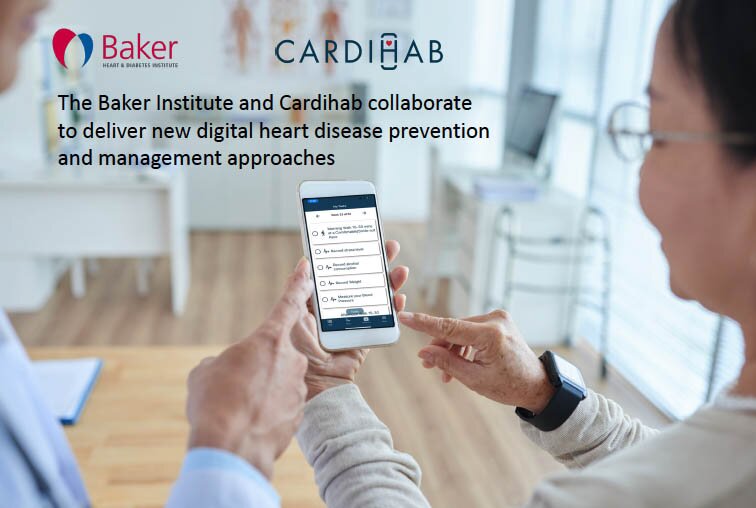The Baker Institute and Cardihab collaborate to deliver new digital heart disease prevention and management approaches
Digital health will take transformative steps by supporting new clinical trials to address secondary prevention of Australia's deadliest disease following an agreement between Australian digital health company Cardihab and medical research organisation, the Baker Heart and Diabetes Institute.
The five-year agreement between Cardihab and the Baker Institute will involve several clinical trials and cohort studies that provide evidence of the effectiveness of digital approaches to cardiovascular disease management, rehabilitation, prevention and treatment.
Cardihab is a landmark Australian digital health platform that facilitates the virtual delivery of cardiac rehabilitation and chronic disease management programs for patients recovering from cardiac events and living with heart disease.
Patients use Cardihab apps to complete their cardiac rehabilitation program virtually while under clinical supervision by qualified healthcare professionals.
Cardihab Chief Executive Officer Helen Souris said it was the first widespread research program to be conducted in Australia using broader applications of Cardihab's digital health platform.
"The outcomes of these clinical trials and studies will impact on the lives of more than 4.2 million people with heart or vascular disease around the country," Ms Souris said.
"Digital solutions that empower patients to proactively manage their health while reducing the pressure on hospitals and staff are essential given the burden of disease and vulnerability of patients, particularly during COVID-19 constraints. Clinically validated digital health programs are vital for people who cannot attend traditional face-to-face clinics, people living in regional and remote areas and patients who are less mobile."
The clinical trials will also facilitate world-leading research into the application of digital cardiac rehabilitation in new areas such as cardio-oncology.
Ms Souris said there was a significant need for risk-guided rehabilitation programs for people who survive cancer but develop cardiovascular disease associated with cancer treatment.
As cancer therapies and survival have improved, millions of patients treated with cardiotoxic therapy are now cancer survivors1. In Australia, cardiovascular disease is the leading cause of non-cancer death in cancer survivors2, and 8per cent of deaths are from heart failure (HF), which occurs in 18per cent of cancer survivors.
"There are a number of cardioprotective strategies that can be implemented to support patients during and after their cancer treatment," Ms Souris said. "Risk-guided Digital cardiac rehabilitation as part of a program of care could be an effective solution that helps manage heart problems in cancer patients and assist in improving their quality of life," Ms Souris said.
Baker Heart and Diabetes Institute Professor Tom Marwick said the Institute was committed to secondary prevention and ensuring people who had a cardiovascular event like a heart attack did not suffer another one.
Solutions which support patients to self-manage chronic long-term conditions such as cardiovascular disease, particularly during challenging COVID-19 lockdowns, are important, Professor Marwick said.
About the Baker Heart and Diabetes Institute
The Baker Heart and Diabetes Institute is based in Melbourne and has made pioneering discoveries to enhance the diagnosis, treatment and prevention of cardiovascular disease, diabetes and related conditions for 95 years.
1 De Sanctis C SR, Jemal A. <cancer-treatment-and-survivorship-facts-and-figures-2014-2015.pdf>.
2 Ye Y, Otahal P, Marwick TH, Wills KE, Neil AL, Venn AJ. Cardiovascular and other competing causes of death among patients with cancer from 2006 to 2015: An Australian population-based study. Cancer 2019;125:442-452.
